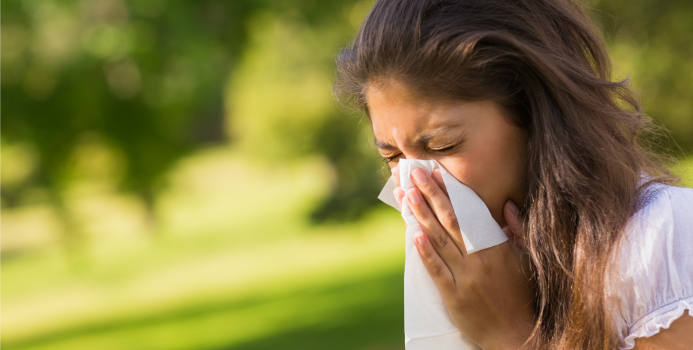If you suffer from allergies, spring might just be your least favorite time of year. But taking an antihistamine isn’t your only line of defence when it comes to hay fever. Here are five other things you can do to prevent allergy symptoms from taking over your life.
1. Eat clean.
Though you might find it hard to believe, your diet can have a huge impact on seasonal allergy symptoms. Found in fruits, vegetables, green tea, nuts, legumes, and seeds, antioxidants help to protect your cells from damage. Clinical studies consistently point to the anti-inflammatory properties of antioxidants. So what does inflammation have to do with your allergy symptoms? Inflammation is exactly what you’re experiencing when you feel stuffed up, sneezy, and itchy around your eyes, nose, ears, and throat. Antioxidants can help you fight it.
2. Lose a couple of pounds.
When you have allergies, it’s harder to breathe. Excess weight can make breathing even more difficult—the more excess weight you’re carrying, the less likely you are to be getting all the oxygen you need. Lack of oxygen can leave you feeling exhausted and irritable, at a time when your immune system is already going haywire.
3. Take natural supplements and treatment to fight symptoms.
Some natural extracts, such as spirulina, echinacea, and shrub butterbur, may help to reduce your allergy and hay fever symptoms. Though the effectiveness and safety of these substances is not clear, some people find them helpful. Others claim that acupuncture treatments can provide some relief. You should have a chat with your doctor before trying alternative medication and treatments.
4. Keep the air in your home clean.
Did you know that the air inside your home can actually be worse for your allergies than the air outside? Carpets, rugs, pillows, drapes, bedding, and other fabrics can trap allergens like pollen inside your house. Though it may be tempting when the warm weather comes around, you should avoid leaving your windows and doors open. Using air conditioning, changing your air filters every three months, and eliminating dampness by using an air humidifier can improve your indoor air quality. Target dust by doing some spring cleaning.
5. If possible, reduce your exposure to allergy triggers.
As a last resort, you can bypass allergy symptoms by staying inside when pollen counts are high. Listen to your local radio station or check the Internet, newspaper, or weather channel for day-to-day pollen levels. When the pollen level is high, take medication if you have to go outside, or if possible, avoid going outside altogether. Pollen levels are at their peak in the early morning The best time to go outside is actually after it rains—a good rain is like a cleanse for the air. Windy days are often the worst. If you do have to go outside, remove your clothes afterwards, as pollen can stick to your clothes. Take a shower to clear up your sinuses.



